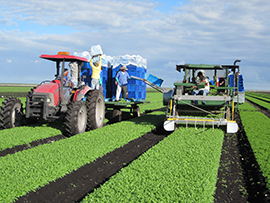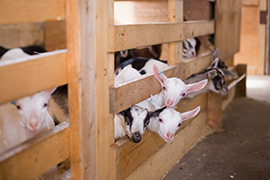ABBOTSFORD – While the Pacific Agriculture Show is celebrating its 20th anniversary this year, the Horticulture Growers’ Short Course – the backbone of the show – has a much longer history. In fact, the Lower Mainland Horticultural Improvement Association, which organizes the annual course, is celebrating its 60th anniversary in 2018.
The annual course includes sessions on strawberries, raspberries and blueberries, hazelnuts, hops, potatoes, vegetables, floriculture, agro forestry, organic production, farm business management, agricultural water management, direct farm marketing and the use of drones.
Register by January 9 and the cost is $90 for the first person from a farm and $80 for each additional person and includes access to all seminars as well as the trade show. After January 9, the registration fee jumps to $120 per person. Online registration forms are available at [www.agricultureshow.net].
Berries
Berries remain at the top of the agenda. Thursday’s sessions focus on strawberry and raspberry production. Blueberries take the spotlight on Saturday while Friday’s sessions should be of interest to all berry growers.
Thursday’s raspberry and strawberry sessions will bring growers up to date on new variety developments in BC, Washington and Oregon as well as grower experiences with some of those new varieties. There will also be information on fumigation and the use of tunnels for strawberry and raspberry production, including grower experiences. The day will conclude with the annual raspberry market outlook.
Saturday, blueberry growers will get valuable insights into managing birds, the Spotted Wing Drosophila, voles and blossom blight. They will also learn how to improve yields and bud set. There will also be information on the blueberry breeding program, new blueberry varieties and market trends. As well, Jorge Retamales of Chile’s Universidad de Talca will describe blueberry production in his country, one of BC’s chief competitors.
The Friday afternoon sessions for all berry growers will discuss farm water irrigation, mites, weevils and vegetative buffers. University of the Fraser Valley students will describe some exciting new apps to help growers while Thomas Elliot will provide information on the use of drones in BC blueberry fields.
Growers and others who want more information on the use of drones in agriculture should attend the Saturday morning sessions in the Evergro Room. They will learn regulations on the use of drones and what the drones can do for them. The morning will conclude with a number of drone demonstration flights.
Business management
Nova Scotia agricultural consultant Gary Morton is this year’s keynote speaker. His hour-long address Friday morning will detail success strategies to produce winning customer relationships and improve farmers’ bottom lines.
Friday morning’s business management session also includes Breanna Leininger of Pacific Customs Brokers in Blaine, who will discuss exporting to the US and the potential impact of NAFTA’s renegotiation. Roberta Cook of Village Farms in California will describe how Mexico is becoming a dominant player in the American fruit and vegetable market.
Water is key to agricultural production, so Friday morning’s water management session should be of considerable interest. The first half will discuss rainwater harvesting and include information on available systems and how rainwater can be used in poultry and other agricultural operations.
The second half will discuss the implications of drought in BC agriculture and how the province is responding. It will include a demonstration of the agriculture water use reporting tool developed by the Okanagan Basin Water Board and the BC Ministry of Agriculture.
Potatoes, field vegetables
Irrigation water quality will also be a topic in the field vegetable sessions on Thursday. Vegetable growers will learn about herbicide resistance, cutworm, armyworm and corn rootworm management as well as cole crop foliar diseases. Growers will also learn about diversifying their operations, particularly the opportunity to expand into production of a new sweet potato developed by the Vineland Research and Innovation Centre.
Conventional potato producers should attend the Friday afternoon sessions. They will learn proactive strategies to manage thrips in potatoes and other rotational crops, gain insights into managing weeds in potatoes and learn about new research into wireworm management. Finally, BC berry breeder Michael Dossett will discuss how gene-editing could be used to boost pest resistance in potatoes and other agricultural crops.
Greenhouse veggies
Maximizing the use of technology has always been key to greenhouse vegetable production.
Saber Miresmailli will describe how robots and artificial intelligence can be used to pinpoint crop stressors earlier in the greenhouse vegetable session Thursday morning. Growers will also learn about innovative new climate screens and how to prevent bursting of their water storage tanks.
The second half of the session will focus on the greenhouse vegetable market, including the impact of trade talks and increasing production in Mexico.
Floriculture
Thursday afternoon in the Evergro Room, the focus shifts to floriculture. Growers will be told why and how they should establish biocontrol agents during propagation.
They will learn which biocontrols work on specific pests and how they are impacted by the concurrent use of pesticides.
Will Healy of Ball Horticultural and Ted van der Gulik of the Partnership for Water Sustainability in BC will discuss how to use irrigation to maximize production while minimizing water usage.
Organic production
When you can’t use inorganic fertilizers and pesticides, what options do you have to manage pests and provide nutrients to your organic vegetable crops?
Answering that question is the focus of the organic production sessions in the BASF Gallery on Saturday.
Options to be discussed include using the right varieties for BC conditions, biopesticides and other biocontrols and managing crops to maximize soil nutrients.
There may even be opportunities to use tunnels to extend the season.
Hazelnuts
The BC Hazelnut Growers Association will be meeting in the FCC Loft Friday morning to discuss how the industry is rebounding from Eastern Filbert Blight.
Growers will hear how the new EFB-resistant cultivars are doing and how those young trees can be protected from emerging diseases. TJ Schur of the BC Ministry of Agriculture will describe the support government is providing while Oregon extension specialist Nik Wiman will detail lessons learned in Oregon.
Direct farm marketing
Now that all types of alcohol production are being allowed in the Agricultural Land Reserve, what do farmers have to do to capitalize on the opportunity?
Randy Brown of the BC Liquor Control and Licensing Branch will provide some of the answers during the direct farm marketing session in the Evergro Room Friday afternoon.
Direct farm marketing is becoming more prevalent, but how do you do that effectively? Offering their insights are Alberta organic beef and potato grower Will Bilozir and Nova Scotia retail marketing consultant Peter Chapman.
Agroforestry
After a short absence, agroforestry is back. Thursday afternoon in the BMO Room, BC Ministry of Agriculture agroforestry specialist Dave Trotter will chair a session describing the potential of agroforestry. Key opportunities include mushroom cultivation, marrying Christmas tree, cattle and forage production, and producing syrup.
Hops
With hop production is attracting so many new growers, the need for reliable information is becoming more critical.
That’s what the BC Hop Growers Association will provide in the BASF Gallery Friday afternoon. Local experts will inform growers how to manage nematodes, downy and powdery mildew and aphids while Paul Sweeting of Ravens Brewing will tell growers what BC craft brewers want from them.

 Lettuce build
Lettuce build